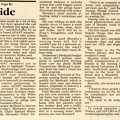Memphis, Sunday, May 10, 1998
[Headline] 500 tp push for Medicaid funds for home aides
[Subheading] At issue is choice, supporters say
The Commercial Appeal
After living nearly 37 years with her parents and logging another nine years in a nursing home, 47-year-old Tena Murphy is settling into life on her own.
"It's definitely home," said Murphy, surveying a one-bedroom apartment accepted by her doll and stuffed animal collections.
A small inheritance from her father's death provided Murphy with money for a subsidized apartment and $72 weekly for a personal assistant.
This week, the debate over whether to expand government funding for personal assistants gets a Memphis pivot point. About 500 are expected here to build support for national legislation to expand government funding for personal assistants.
"The issue isn't to shot nursing homes down, but to provide real choice," said Michael Auberger, 42, of Denver.
Auberger is national organizer and co-founder of ADAPT, a disability-rights group that has organized four days of workshops, meetings and demonstrations. Founded in 1983, ADAPT (American Disabled for Attendant Programs Today) has pushed for improved transportation and alternatives to nursing homes.
Events kick off today with a 3:30 p.m. Court Square rally.
The Memphis gathering comes shortly after the Tennessee legislative session ended without expanding the Medicaid funding for home and community services as an alternative to nursing home care.
Instead, legislators created an advisor council to develop a comprehensive state plan for long-term care services, excluding nursing homes. The plan's expected in January.
"I'm disappointed we didn't put money into (home and community services) now," said Rep. John Arriola (D-Nashville), the bill's House sponsor.
The bill originally called for channeling half of any future Medicaid budget increase to pay for services, such as personal aides, meals and transportation, that could help people avoid nursing homes. Arriola said the funding provision was dropped because it lacked adequate support.
Auberger said that's why ADAPT favors national legislation.
"States could do a lot of this now, but have ignored the call of the disabled and aging community," said Bob Kafka, 52, an Austin-based ADAPT member.
"Congress has to take action. This is a very passionate issue. We call this a civil rights issue. People are being forced into institutions" because state Medicaid programs won't pay for personal aides and other support services, Kafka said.
Both Kafka and Auberger rely on wheelchairs.
ADAPT members are in Memphis to highlight Tennessee's shortcomings and push a bill now before Congress.
ADAPT uses workshops, street theater and nonviolent protest to intensify its message.
At similar gatherings in other cities, ADAPT members were arrested in demonstrations that have included chaining themselves to the White House fence, blocking buses and driveways or piling into congressional offices.
Auberger declined to discuss the group's Memphis plan. Deputy Chief Samuel Moses said the Memphis Police Department believes it includes action that could trigger arrest. But he said the group hasn't discussed anything with police.
Murphy's plans include attending today's workshops and rally.
She said without an aide who spends about 12 hours a week helping her shop, clean, dress and bathe, she'd still be in King's Daughters and Sons Home.
Medicaid paid Murphy's nursing home bill, but it wouldn't pay for a personal assistant because she wasn't homebound and didn't need 24-hour help.
Tennessee's Medicaid budget is about $672 million, most going to underwrite nursing home care for about 30,000 Tennesseans. Medicaid is separate from the state's TennCare health program.
More than 70 percent of Tennessee nursing home residents qualify for Medicaid, which is funded with state and federal dollars. Eligibility is linked to a person's income and assets.
Until Murphy could afford to pay her own assistant, a nursing home was her only option. An only child, Murphy lived at home with her parents until her mother died and a traffic accident eventually sent her father to a nursing home. Both parents are now deceased.
"Tena is an example of what home and community-based services can do," said Bernarc Danzig, Plough Towers director. Murphy spent two years on its waiting list.
Danzig said he and nursing home administrators were un sure if Murphy could handle life on her own.
The first month was difficult Simple things like dressing were a problem.
But now she's enrolled in computer class and plans to earn her GED and begin college.
She helps in the Plough Towers library and handles resident E-mail.
Murphy relies heavily on public transportation to visit friends in the nursing home and attend University of Men-phis basketball games. She serves on the local ADAPT board and a Memphis Area Transit Authority advisory council.
Recently, she hosted her first party.
"Iwant to show people in the community we (in the disability community) are active," said Murphy.
"We need to be independent."
To reach reporter Mary Powers, call 529-2383 or E-mail powers@gomemphis.com
- Created on
- Thursday 18 July 2013
- Posted on
- Wednesday 27 November 2019
- Albums
- Visits
- 297
- Rating score
- no rate
- Rate this photo


0 comments